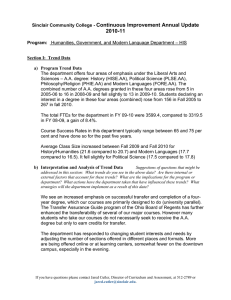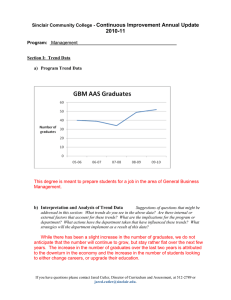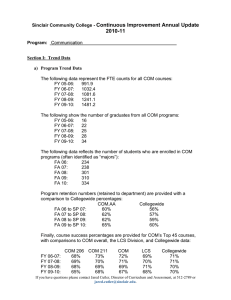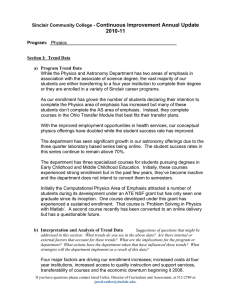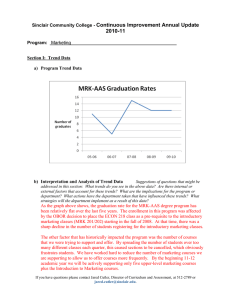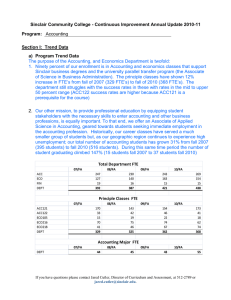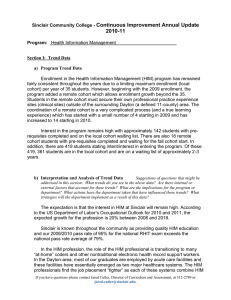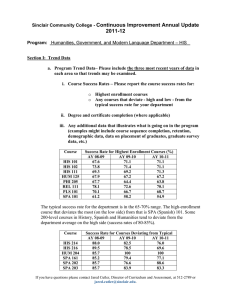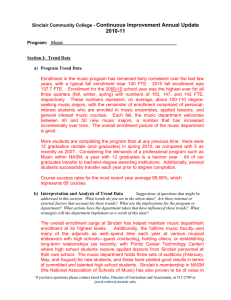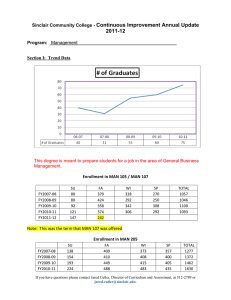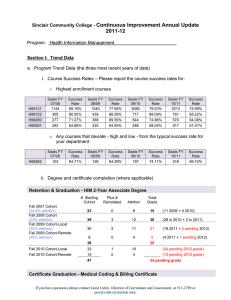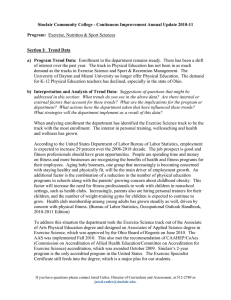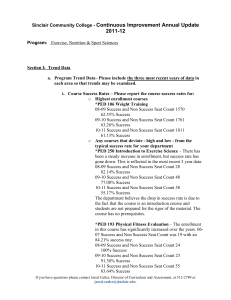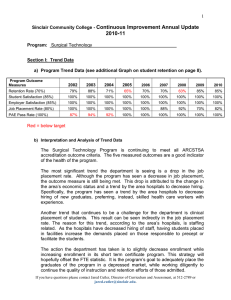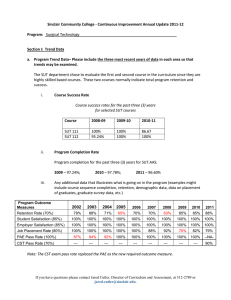Continuous Improvement Annual Update 2011-12
advertisement
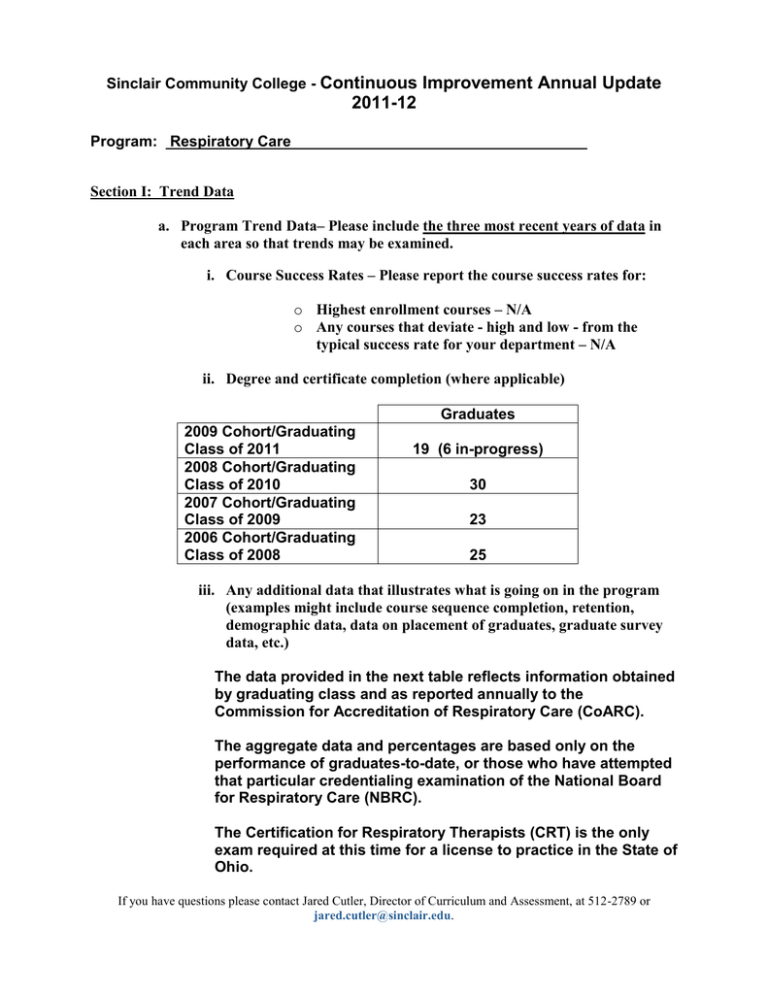
Sinclair Community College - Continuous Improvement Annual Update 2011-12 Program: Respiratory Care Section I: Trend Data a. Program Trend Data– Please include the three most recent years of data in each area so that trends may be examined. i. Course Success Rates – Please report the course success rates for: o Highest enrollment courses – N/A o Any courses that deviate - high and low - from the typical success rate for your department – N/A ii. Degree and certificate completion (where applicable) Graduates 2009 Cohort/Graduating Class of 2011 2008 Cohort/Graduating Class of 2010 2007 Cohort/Graduating Class of 2009 2006 Cohort/Graduating Class of 2008 19 (6 in-progress) 30 23 25 iii. Any additional data that illustrates what is going on in the program (examples might include course sequence completion, retention, demographic data, data on placement of graduates, graduate survey data, etc.) The data provided in the next table reflects information obtained by graduating class and as reported annually to the Commission for Accreditation of Respiratory Care (CoARC). The aggregate data and percentages are based only on the performance of graduates-to-date, or those who have attempted that particular credentialing examination of the National Board for Respiratory Care (NBRC). The Certification for Respiratory Therapists (CRT) is the only exam required at this time for a license to practice in the State of Ohio. If you have questions please contact Jared Cutler, Director of Curriculum and Assessment, at 512-2789 or jared.cutler@sinclair.edu. 2011 Graduates 2010 Graduates 2009 Graduates 2008 Graduates Certification CRT 18/18 (100%) 30/30 (100%) 23/23 (100%) 25/25 (100%) Written RRT 11/13 (84.6%) 28/28 (100%) 21/21 (100%) 22/24 (91.7%) Clinical Simulation RRT 10/13 (76.9%) 27/28 (96.4%) 20/21 (95.2%) 21/22 (95.5%) Overall Employer Satisfaction TBD 95.8% 94.4% 88.8% Overall Graduate Satisfaction TBD 100% 100% 88% Positive Placement within 6 mos. 89% 96.7% 78.3% 88% On-time Graduation Rate 84.6% 87.1% 80.8% 86.4% Attrition by Starting Cohort TBD 19% 55.3% 27.9% b. Interpretation and Analysis of Trend Data Included in the Section Above Suggestions of questions that might be addressed in this section: What trends do you see in the above data? Are there internal or external factors that account for these trends? What are the implications for the program or department? What actions have the department taken that have influenced these trends? What strategies will the department implement as a result of this data? Attrition continues to be the primary problem area of our program despite a variety of strategies over the past several years. As the admissions process changes to a competitive format, we hope retention will be greatly improved. If you have questions please contact Jared Cutler, Director of Curriculum and Assessment, at 512-2789 or jared.cutler@sinclair.edu. Section II: Progress Since the Most Recent Review a) What was the fiscal year of the most recent Program Review for this program? (The most recent Program Review self-study can be found at http://www.sinclair.edu/about/administrative/vpi/pdreview/ ). 08-09 b) Briefly summarize the goals that were listed in Section IV part E of the most recent Program Review Self-Study (this section of the Self-Study asks “What are the department’s/program’s goals and rationale for expanding and improving student learning, including new courses, programs, delivery formats and locations”)? Increase clinical affiliation/adding or increasing clinical rotations. Improve retention. Secure additional adjunct faculty. c) What Recommendations for Action were made by the review team to the most recent Program Review? i. As faculty retire and new faculty join the department, continued attention to maintaining the program’s relationships with clinical sites and professionals throughout the region will be essential. ii. Given the anticipated retirements and the short supply of qualified faculty, the department may wish to mentor some of its current students who show promise for becoming excellent faculty in the future. iii. The department has worked diligently to reduce its high attrition rate. This attrition rate is not atypical among such programs at other institutions, but the department is strongly encouraged to seek new ways to retain more students. Identifying characteristics of students who persist versus those who leave may provide useful information for developing intervention strategies. Based on the reports of faculty, it appears that new approaches to helping students understand the rigor of the program prior to entry as well as the nature of professional practice in this field would be helpful. d) Have the goals in your self-study changed since your last Program Review Self-Study as a result of the Review Team recommendations or for any other reason? If so, please describe the changes. No, these three items are still a high priority for our department. If you have questions please contact Jared Cutler, Director of Curriculum and Assessment, at 512-2789 or jared.cutler@sinclair.edu. e) What progress has been made toward meeting any of the goals listed in the sections above (b, c, and d) in the past year? i. No additional clinical affiliates have been secured. Program consistently maintains close and professional relationships with existing affiliates. ii. A recent graduate has been employed for laboratory instruction. Clinical faculty members are still difficult to secure for the days and times we need them. Clinical instruction under the semester format will necessitate almost twice as many adjuncts as we currently have during the first eight weeks of the winter term. iii. As part of the semester conversion process, a new introductory course to Respiratory Care was added as a required prerequisite. This should enable program faculty to interact early in the applicant’s admission process. In addition, it will ensure that students truly understand the profession in detail, and alert them to the rigors and requirements of the program. As a result of the May 2012 CoARC accreditation site visit, the program was directed to take significant measures to decrease attrition or face a potential change to its full accreditation status. Therefore, a plan was researched and implemented to move the program to a totally competitive admission process. This will hopefully increase the selection of better academically-prepared students who will be more likely to be successful in the program. As the students will be selected on objective criteria, there may still be some students who may not be able to complete the skill portion of the curriculum. There will no longer be a waiting/eligibility list as interested students would need to reapply annually if they are not selected for the program on their first application. Individuals that were on the Eligibility List after the 2011 cohort started were grandfathered to the class of 2012 provided they met the entry requirements under semesters. If you have questions please contact Jared Cutler, Director of Curriculum and Assessment, at 512-2789 or jared.cutler@sinclair.edu. Section III: Assessment of Outcomes The Program Outcomes for this program are listed below. At least one-third of your program outcomes must be assessed as part of this Annual Update, and across the next three years all of these program outcomes must be assessed at least once. Respiratory Care Program Outcomes In which courses are these program outcomes addressed? Which of these program outcomes were assessed during the last fiscal year? Assessment Methods Used Communication skills Clinical evaluation 1) Demonstrate personal behaviors and attitudes consistent and appropriate to the advanced respiratory care professional. RET 280 2) Demonstrate the ability to comprehend, apply, and evaluate information relevant to the job description of an advanced respiratory care practitioner. RET 280 Mock board exams (CRT, RRT, CSE) 3) Perform all prescribed therapeutic modalities and diagnostic procedures relevant to the job description of advanced respiratory care practitioners. RET 280 Skill proficiencies a) For the assessment methods listed in the table above, what were the results? All students must successfully complete all of the assessments listed above or they do not graduate. In a few cases, the mock boards may need to be taken a second time during the capstone course to achieve the required competency, but all students do pass by the end of the quarter. Performance on these assessments (especially the mock board exams) correlates highly with the results achieved on the examinations postgraduation. b) Were changes planned as a result of the data? If so, what were those changes? The program faculty members consistently review the data from the summative assessments to identify areas for improvement. Major changes are made when new examination matrices are provided, and/or significant decreases in graduate performance is noted on the examinations or from the graduate and employer surveys. No additional changes were required this past year. If you have questions please contact Jared Cutler, Director of Curriculum and Assessment, at 512-2789 or jared.cutler@sinclair.edu. c) How will you determine whether those changes had an impact? Any changes implemented would be expected to increase/improve poor results within a few years after being implemented. c) Starting with next year’s Annual Update, this section will ask about assessment of general education outcomes. For FY 2012-13, you will be asked how the department is assessing Oral Communication and Written Communication in your courses, and in addition you will be asked to share the results of those assessments. Please be prepared to address this in next year’s Annual Update. d) Does your department have courses where there are common assignments or exams across all sections of the course? If so, please list those courses, and indicate whether you are currently examining results across all sections of those courses. N/A, but if it is implemented under the semester format, all sections of a course would utilize the same assignments and examinations. Consistency across sections and/or instructors would be evaluated and assured. Section IV: Improvement Efforts for the Fiscal Year a) FY 10-11: What other improvement efforts did the department make in FY 10-11? How successful were these efforts? What further efforts need to be made? If your department didn’t make improvement efforts during the fiscal year, discuss the strengths and weaknesses of the department over the last year and how the department plans to address them in the coming year. Efforts were focused on semester conversion and the accreditation renewal process. A competitive admissions process was research, approved and implemented. However, results will not be seen until the 2012 cohort graduates in 2014. b) FY 11-12: What improvement efforts does the department have planned for FY 11-12? How will you know whether you have been successful? With the change to semesters, the department constituents will focus primarily on assuring quality and consistency in the new curricula. We will know we are successful if performance by the graduates on summative assessments does not decline. Questions regarding completion of the Annual Update? Please contact the Director of Curriculum and Assessment at 512-2789 to schedule a time to review the template and ask any questions. If you have questions please contact Jared Cutler, Director of Curriculum and Assessment, at 512-2789 or jared.cutler@sinclair.edu.
